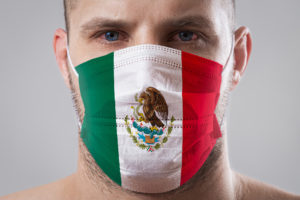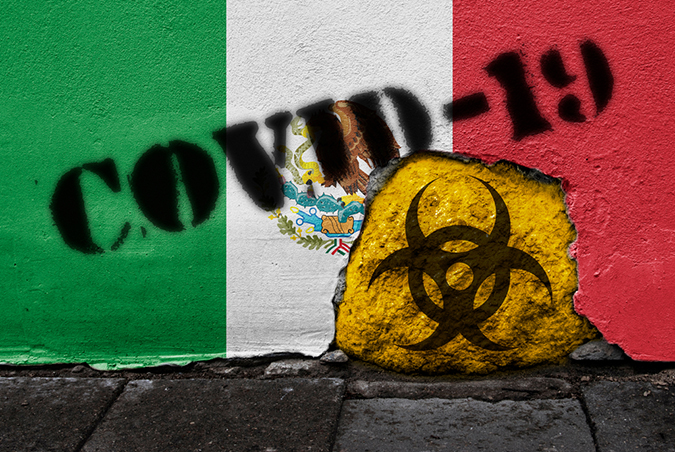
Design/ABambina/Shutterstock.com
On Monday March 16th, as Mexico faced 82 confirmed and 171 suspected coronavirus cases, the country’s president, Andrés Manuel López Obrador (AMLO), walked into his routine morning press conference and refused to use the antibacterial gel that was offered to him. Such nonchalance is emblematic of the attitude of a government that has systematically dismissed the seriousness of the COVID-19 pandemic, with AMLO claiming at the beginning of March that “there is nothing to worry about, we should all hug each other.”
ADMITTING THE RISK

CTischler/Shutterstock.com
Not only that, but when the media raised concerns about the president’s behavior at rallies, namely the fact that he routinely hugs and kisses supporters as well as their children, the sub-secretary for prevention and promotion of health, Hugo López-Gatell, claimed that the president becoming infected would be good thing, given that he would become immune – despite his being 60 years old. When people voiced concerns about the risk that he presented by possibly spreading the virus, he replied there was nothing to worry about because the President’s strength is “a moral one, not one of contagion.”
This populist rhetoric and the absurdity of the discourse held by the government and his administration are illustrative of the incompetence of the Mexican government when facing a crisis of such magnitude. The government response to this crisis has been ignorant at best, and outrageously irresponsible at worst.
WHY STOP GOING OUT?
Indeed, there has been no clear statement from the administration regarding the measures that should be taken to address the spread of the virus; instead, it has done nothing but send mixed messages that serve to confuse the population. Just to give a few examples, last week the Public Education Secretary announced that spring break was to be “moved up” and that classes would be stopped in all public establishments from March 20th to April 20th. The poor phrasing around this announcement resulted in confusion among the population, as the suspension of educational activities was presented as a “holiday” and was not to start until the following week, with regular activities continuing through the week of March 16th.
On top of that, the government showed a complete lack of competence in failing to cancel the Vive Latino music festival that was to occur during the weekend of March 14-15. This is one of the largest music festivals in Mexico which gathered over 200 000 people in 2019. Although Mexico City’s mayor, Claudia Sheinbaum, announced that measures such as the distribution of antibacterial gel and the taking of attendees’ temperature at the entrance would be taken, this falls extremely short of what a reasonable government should have done.
GET IT RIGHT!
Finally, we can also see this irresponsibility in the incoherence of the messages put forth by the government. On March 15th, the National Commission for Physical activity and Sport tweeted an infographic with a header reading “COVID-19 is not an emergency situation,” claiming that activities should continue as normal, as the disease caused by the virus “is not severe.” The tweet was later deleted.
This lack of an appropriate response by the government forced private and independent entities to take actions of their own, with universities such as the National Autonomous Mexican University, the largest in the country, cancelling their activities. This allowed for other schools to follow its lead, such as the ITAM and Anáhuac – among others – which took similar actions.
As necessary as these measures were, it should not be the role of private actors to take initiatives the government should be implementing. This could put future measures taken by the administration into question, as they might be seen as a response to outside pressure rather than a carefully thought out policy implementation. It could also cause incoherence in the measures taken by private versus public actors. On top of this, it also puts these institutions in danger of being seen as overstepping their bounds. This is particularly the case in the context of independent universities, whose relationship with AMLO’s government is already strained, given their pushback against certain administration decisions and the president’s hostility towards their legally guaranteed autonomy.
ECONOMICS OR HEALTH
This governmental response is even more concerning given the consequences that this pandemic will have on the Mexican economy and the social welfare of its population. The need for extreme measures has exposed deep flaws in the country’s security network.
There are numerous problems with enforcing a nationwide quarantine. First of all, Mexico’s workers are largely employed in the informal sector of the economy, as 6 out of 10 workers do not have a formal employment contract, and around 25% of the country’s GDP stems from that sector. This means that millions of workers do not benefit from labour protection such as paid days off, and cannot afford to stop going to work to self-quarantine. This population lives on a day-to-day basis, and thus missing even a single day of work could result in millions of Mexican families not having food on the table.
ILL-EQUIPPED SYSTEM

EveryonePhoto/Shutterstock.com
Not only that, but the healthcare system is not equipped to handle a crisis of this scale. Around two thirds of the country’s active population does not have access to free healthcare, and there have already been reports of COVID-19 tests costing up to 18 000 pesos (600 euros) if the patient does not have access to social security. To put that into perspective, that represents around 225 days of work for someone living on a minimum wage salary.
Second, the suspension of classes poses a huge problem, as only around 60% of households have access to the internet in the country, and only 12% of public schools have an internet connection. The implementation of online classes is not feasible, and to pretend it is would be a disservice to the children in the country and an infringement on their right to education.
SHELTER WITH ABUSER
Finally, the use of a confinement strategy would be problematic because of the very nature of gender dynamics in Mexico – namely the fact that domestic violence is a huge problem in the country. Indeed, 19.4% of women over 15 have reported having faced violence by their partners, and out of the 10 women killed a day, 6 of those are killed by their partners. Women would be quarantined at home with their abusers and emergency resources are even more unlikely to be available than usual as they are mobilized to treat the virus.
However, the presence of these issues cannot justify government inaction. Nationwide quarantine is the only way to prevent unnecessary deaths caused by a disastrous healthcare system being overwhelmed. This should be implemented, along with measures to provide for families and businesses that would be most affected by being forced to stop working. The Coronavirus pandemic has been addressed terribly. Populist rhetoric by the administration has clouded the true urgency of the situation and action has to be taken immediately to limit fatalities.
MISBELIEFS
This lack of a response might be due to the fact that AMLO ran his campaign on a promise of economic prosperity and a rise in living standards, something he has repeatedly failed to deliver as the Mexican economy has slowly gone into a recession. Having to implement such drastic measures would only make these matters worse. On top of that, his platform was very much based on an exceptionalist/populist discourse, with the strength of the Mexican people being placed front and center. Accepting the fact that not only the country’s population, but also himself are vulnerable to this threat would go completely against his previous discourse.
NOT A CHOICE
The Mexican government needs to do better: coherent and more aggressive measures need to be implemented. It is the only way to prevent a crisis that would be disastrous for the population. Let this serve as a wake up call to Mexican authorities. Social security measures are urgent. No family should ever have to choose between remaining healthy and being able to put food on the table.

bekulnis/Shutterstock.com
Originally published by Sundial Press.
About the Article
A look at how Mexico faces the Covid-19 crisis.



